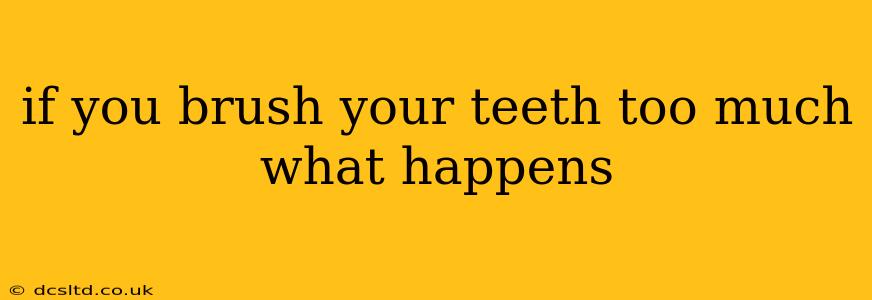The Consequences of Brushing Your Teeth Too Much: More Isn't Always Better
Brushing your teeth is crucial for maintaining good oral hygiene, but like most things, moderation is key. Brushing too often or too vigorously can lead to several negative consequences for your teeth and gums. This article will explore the potential downsides of excessive brushing, addressing common concerns and providing insights into maintaining a healthy oral care routine.
What happens if you brush your teeth too much?
Brushing your teeth too frequently can damage your tooth enamel, the protective outer layer of your teeth. Excessive brushing wears away this enamel, making your teeth more susceptible to cavities, sensitivity, and discoloration. You might also experience gum recession, where the gum tissue pulls back, exposing the roots of your teeth and increasing the risk of infection. This can lead to discomfort and even tooth loss in severe cases.
How often should you brush your teeth?
The general recommendation is to brush your teeth twice a day, for two minutes each time, using a fluoride toothpaste. This ensures thorough cleaning without excessive abrasion. More isn't necessarily better; focusing on proper technique is far more important than the frequency.
Can brushing too hard damage your teeth?
Yes, absolutely. Brushing too hard, even with the recommended twice-daily routine, can cause enamel erosion and gum recession. Using a hard-bristled toothbrush exacerbates this problem. Opt for a soft-bristled brush and use gentle, circular motions.
What are the signs of brushing too hard or too much?
Several signs indicate you might be brushing too aggressively or too often:
- Sensitive teeth: Experiencing pain or discomfort when consuming hot or cold foods and drinks is a common sign of enamel erosion.
- Receding gums: Noticeable gum recession, where the gums pull away from the teeth, is a clear indication of excessive brushing.
- Bleeding gums: While some bleeding is normal, consistent bleeding after brushing suggests you're brushing too hard.
- Wear and tear on your toothbrush bristles: If your toothbrush bristles become frayed or worn quickly, it's a sign you're brushing too aggressively.
What should I do if I think I'm brushing my teeth too much?
If you suspect you're brushing too much or too hard, consult your dentist immediately. They can assess the condition of your teeth and gums and offer personalized advice. They might recommend adjustments to your brushing technique, suggest a different toothbrush, or even advise on fluoride treatments to help repair any damage.
How can I prevent damage from brushing too much?
Preventing damage from excessive brushing is primarily about technique and moderation:
- Use a soft-bristled toothbrush: Hard bristles are far more likely to cause damage.
- Brush gently: Use gentle, circular motions instead of aggressive scrubbing.
- Limit brushing to twice a day: Sticking to the recommended twice-daily brushing routine minimizes the risk of damage.
- Use fluoride toothpaste: Fluoride helps strengthen enamel and protect against cavities.
- See your dentist regularly: Regular dental checkups allow your dentist to identify and address any potential problems early on.
By following these guidelines and consulting your dentist, you can maintain excellent oral hygiene without risking damage from over-brushing. Remember, a healthy mouth is a happy mouth, and achieving that balance between thorough cleaning and protecting your enamel is key.
